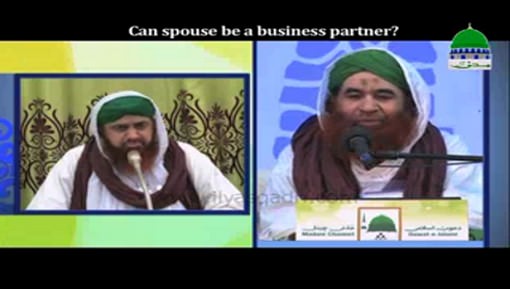
Trading was the occupation of many people of Makkah Mukarramah. The Beloved Rasool صَلَّى اللهُ تَعَالٰى عَلَيْهِ وَاٰلِهٖ وَسَلَّم also travelled to Syria twice and once to Yemen for trading. He صَلَّى اللهُ تَعَالٰى عَلَيْهِ وَاٰلِهٖ وَسَلَّم made his first trade journey to Syria at the age of 12 with his uncle Abu Taalib. (Sunan-ut-Tirmizi, vol. 5, pp. 356, Hadees 3640; Seerat-e-Mustafa, pp. 86)
There isn’t another example of the level of integrity, truth, honesty and trust that he صَلَّى اللهُ تَعَالٰى عَلَيْهِ وَاٰلِهٖ وَسَلَّم showed while conducting trade. It is necessary for a successful trader to possess the great attributes of truthfulness, honesty, trustworthiness, fulfilling promises, and courtesy. The Beloved Rasool صَلَّى اللهُ تَعَالٰى عَلَيْهِ وَاٰلِهٖ وَسَلَّم was the embodiment of all these admirable qualities.
Trade and honouring promises
Sayyiduna ‘Abdullah Bin Abil Hamsa رَضِىَ اللهُ تَعَالٰی عَـنْهُ has narrated: Prior to his declaration of Nubuwwah, I made a business deal with the Beloved Rasool صَلَّى اللهُ تَعَالٰى عَلَيْهِ وَاٰلِهٖ وَسَلَّم. I already paid some amount of what I owed him but it was a considerable sum. I promised him that I would instantly go home and return with the remaining sum of money; but I forgot to return for three days. Then, when I [eventually remembered and] turned up at that place, I found him waiting at the same place. My failure to keep my promise did not infuriate him; he صَلَّى اللهُ تَعَالٰى عَلَيْهِ وَاٰلِهٖ وَسَلَّم only remarked: ‘Young man! You have troubled me; I have been waiting here for three days’. (Abu Dawood, vol. 4, pp. 388, Hadees 4996)
Never argued
Likewise, another Sahabi [companion] Sayyiduna Saa’ib رَضِىَ اللهُ تَعَالٰی عَـنْهُ has narrated: Before his declaration of Nubuwwah, the Beloved Rasool صَلَّى اللهُ تَعَالٰى عَلَيْهِ وَاٰلِهٖ وَسَلَّم was my business partner and he was a very good [business] partner; never did he صَلَّى اللهُ تَعَالٰى عَلَيْهِ وَاٰلِهٖ وَسَلَّم fight or argue. (Abu Dawood, vol. 4, pp. 342, Hadees 4836)
Trip to Syria
When the Beloved Rasool صَلَّى اللهُ تَعَالٰى عَلَيْهِ وَاٰلِهٖ وَسَلَّم was around 25 years old, Sayyidatuna Khadijah رَضِیَ اللهُ تَعَالٰی عَنْهَا sent him a message due to his integrity and honesty, offering him double amount for taking her trade goods to Syria. The Beloved Rasool صَلَّى اللهُ تَعَالٰى عَلَيْهِ وَاٰلِهٖ وَسَلَّم accepted her offer and left for Syria with trade goods. In this journey, he صَلَّى اللهُ تَعَالٰى عَلَيْهِ وَاٰلِهٖ وَسَلَّم was accompanied by Maysarah, slave of Sayyidatuna Khadijah رَضِیَ اللهُ تَعَالٰی عَنْهَا. This was the second trade journey of Rasoolullah صَلَّى اللهُ تَعَالٰى عَلَيْهِ وَاٰلِهٖ وَسَلَّم to Syria. After selling the trade goods quickly, he صَلَّى اللهُ تَعَالٰى عَلَيْهِ وَاٰلِهٖ وَسَلَّم returned to Makkah Mukarramah. As his trade caravan entered Makkah Mukarramah, Sayyidatuna Khadijah رَضِیَ اللهُ تَعَالٰی عَنْهَا saw the trade caravan arriving. From the upper room, she saw the Beloved Rasool صَلَّى اللهُ تَعَالٰى عَلَيْهِ وَاٰلِهٖ وَسَلَّم, she noticed that two angels were shading the blessed head of the Beloved Rasool صَلَّى اللهُ تَعَالٰى عَلَيْهِ وَاٰلِهٖ وَسَلَّم from sunlight. (Madarij-un-Nubuwwah, vol. 2, pp. 27, paraphrased)
Dear Muslim traders! The success in this world and the Hereafter lies in conducting trade in accordance with the Sunnah. May Allah عَزَّوَجَلَّ make us follow the Sunnah of the Beloved Rasool صَلَّى اللهُ تَعَالٰى عَلَيْهِ وَاٰلِهٖ وَسَلَّم sincerely and wholeheartedly.
اٰمِیْن بِجَاہِ النَّبِیِّ الْاَمِیْن صلَّی اللہ تعالٰی علیہ واٰلہٖ وسلَّم






















Comments